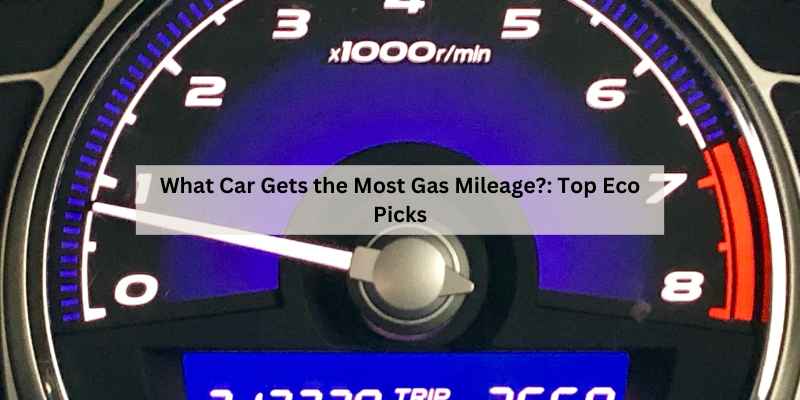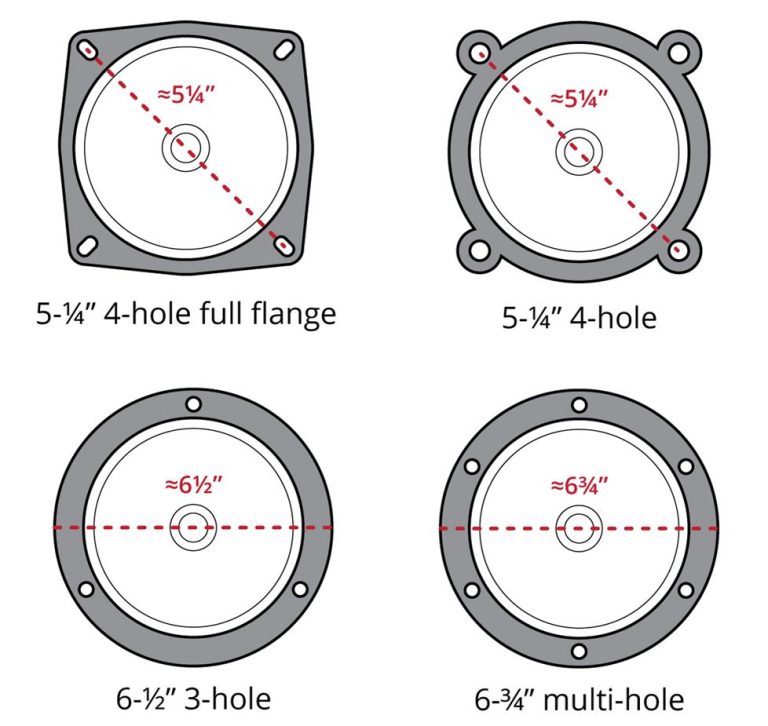What Car Gets the Most Gas Mileage?: Top Eco Picks
The car that gets the most gas mileage is the 2023 Toyota Prius, achieving an impressive 58 MPG combined. The Hyundai Ioniq Hybrid closely follows, with a combined rating of 58 MPG as well.
Gas mileage is a crucial factor for many car buyers today. With rising fuel costs and environmental concerns, selecting a fuel-efficient vehicle is more important than ever. Various models now offer exceptional gas mileage, making it easier to save money while reducing your carbon footprint.
The right car can help you navigate daily commutes or long trips without frequent stops at the gas station. Understanding the options available can empower buyers to make informed choices that align with their budget and lifestyle. Explore the top contenders in fuel efficiency to discover the best fit for your needs.
Introduction To Fuel Efficiency
Gas mileage is important for saving money and protecting the environment. High fuel efficiency means less money spent on gas. It also reduces harmful emissions that contribute to climate change.
Choosing a car with great gas mileage can lower fuel costs. It helps families stay within budget. This choice also supports a healthier planet for future generations.
Cars with excellent gas mileage often lead to less traffic. Fewer vehicles on the road mean less congestion and cleaner air. Small changes can make a big difference.
Measuring Gas Mileage
Gas mileage is measured in miles per gallon (MPG). This number tells how far a car can go on one gallon of fuel. Higher MPG means better fuel efficiency. Many people want cars that save money on gas.
The Environmental Protection Agency (EPA) sets standards for testing gas mileage. They test cars under controlled conditions. This helps provide accurate MPG numbers. Testing includes city and highway driving. City driving usually has lower MPG than highway driving.
Many cars now offer hybrid or electric options. These vehicles often achieve better MPG than traditional gas cars. Understanding these ratings helps buyers choose the best car for their needs.
Top Performing Sedans
Compact sedans offer great fuel efficiency. Cars like the Honda Civic and Toyota Corolla stand out. They can achieve over 40 MPG on the highway. These vehicles are perfect for city driving too.
Full-size sedans can also be efficient. The Toyota Avalon and Chevrolet Impala have impressive mileage. Some models reach about 30 MPG combined. This makes them suitable for families and long trips.
| Car Model | Type | MPG |
|---|---|---|
| Honda Civic | Compact Sedan | 42 MPG |
| Toyota Corolla | Compact Sedan | 40 MPG |
| Toyota Avalon | Full-Size Sedan | 30 MPG |
| Chevrolet Impala | Full-Size Sedan | 28 MPG |
Leading Eco-friendly Hatchbacks
Many eco-friendly hatchbacks offer excellent gas mileage. These cars help save money and the environment. Popular models include the Toyota Prius and Honda Insight. They achieve impressive MPG ratings.
Hybrid hatchbacks combine a gasoline engine with an electric motor. This design leads to higher fuel efficiency. Conventional hatchbacks are often cheaper but less efficient. They still provide good fuel economy.
| Model | Type | MPG |
|---|---|---|
| Toyota Prius | Hybrid | 56 |
| Honda Insight | Hybrid | 55 |
| Ford Fiesta | Conventional | 31 |
| Volkswagen Golf | Conventional | 29 |
Outstanding Suvs For Gas Mileage
Many crossovers offer great fuel economy. These vehicles help save money at the pump. Popular choices include the Honda CR-V and the Toyota RAV4. Both provide excellent miles per gallon (MPG) ratings.
Large SUVs can also be efficient. The Ford Explorer and Chevrolet Tahoe stand out in this category. They have advanced engines that maximize fuel efficiency. Choosing the right vehicle can lead to significant savings.
| Vehicle | MPG |
|---|---|
| Honda CR-V | 28 |
| Toyota RAV4 | 27 |
| Ford Explorer | 24 |
| Chevrolet Tahoe | 23 |
Electric Vehicles And Gas Mileage
Electric vehicles (EVs) are changing the way we think about gas mileage. They use electricity instead of gasoline. This means they don’t need fuel in the same way. EVs can be much more efficient than traditional cars.
Many EVs can travel over 100 miles on a single charge. This is much better than most gas cars. The energy used by EVs is often measured in miles per kilowatt-hour (miles/kWh).
| EV Model | Miles per kWh |
|---|---|
| Tesla Model 3 | 4.1 |
| Chevrolet Bolt | 4.0 |
| Nissan Leaf | 3.9 |
The role of electric cars in eco-driving is significant. They help reduce carbon emissions and save fuel. This makes them a better choice for the planet.
Technological Advances In Fuel Efficiency
Recent innovations in engine design play a key role in improving fuel efficiency. New technologies, such as turbocharging and direct fuel injection, help cars use less gas. These methods enhance power output while reducing fuel consumption.
Aerodynamics also greatly affects a car’s mileage. Cars with sleek designs face less air resistance. This leads to better fuel economy. Weight reduction is another important factor. Lighter vehicles require less energy to move, which boosts efficiency.
| Factor | Impact on Fuel Efficiency |
|---|---|
| Engine Design | Improves power and reduces fuel usage |
| Aerodynamics | Reduces air resistance |
| Weight Reduction | Requires less energy to operate |
Tips For Maximizing Your Car’s Mpg
To maximize your car’s MPG, focus on your driving habits. Smooth acceleration and braking help save fuel. Avoid speeding, as it decreases fuel efficiency. Keep your speed steady on highways for better mileage. Use cruise control when possible to maintain a constant speed.
Regular maintenance is key for better fuel economy. Check tire pressure often; under-inflated tires waste gas. Change the oil as recommended to keep the engine running smoothly. Clean or replace air filters regularly for optimal performance. Ensure that the fuel system is functioning well.
| Tip | Benefit |
|---|---|
| Smooth driving | Improves fuel efficiency |
| Regular maintenance | Keeps engine healthy |
| Proper tire pressure | Reduces gas consumption |
| Use cruise control | Maintains steady speed |
Future Of Fuel Efficiency
The automotive industry is rapidly evolving towards better fuel efficiency. New technologies aim to reduce emissions and save fuel. Electric vehicles (EVs) are becoming more popular. They use less energy than traditional cars. Hybrid models combine gas and electric power for better mileage.
Hydrogen fuel cells are another exciting option. They produce zero emissions while offering long range. Lightweight materials help cars use less energy. This makes them more efficient and faster.
Autonomous driving can also improve fuel efficiency. Smart cars optimize routes and reduce stop-and-go driving. As technology advances, cars will become greener and smarter.
Frequently Asked Questions
What Car Has The Best Fuel Efficiency?
The Toyota Prius is often recognized for its exceptional fuel efficiency. It consistently delivers impressive miles per gallon (MPG), making it a popular choice among eco-conscious drivers. Its hybrid technology maximizes fuel usage, allowing for longer trips without frequent refueling.
This makes it a top contender in the mileage category.
How Can I Improve My Car’s Gas Mileage?
To improve gas mileage, maintain proper tire pressure and perform regular engine tune-ups. Additionally, minimize idling and avoid aggressive driving habits. Using cruise control on highways can also enhance efficiency. Finally, consider removing excess weight from your vehicle to optimize fuel consumption.
What Factors Affect A Car’s Gas Mileage?
Several factors influence a car’s gas mileage, including engine size, vehicle weight, and aerodynamics. Driving habits, tire condition, and maintenance practices also play significant roles. Weather conditions and terrain can further impact efficiency. Understanding these factors helps drivers make informed choices for better fuel economy.
Are Electric Cars More Fuel-efficient?
Yes, electric cars are typically more fuel-efficient than traditional gasoline vehicles. They convert energy from the grid to power the vehicle with minimal waste. Many electric models also have lower operating costs, as electricity is often cheaper than gasoline. This makes them an attractive option for eco-conscious drivers.
Conclusion
Choosing a car with the best gas mileage can save you money and reduce your carbon footprint. Fuel-efficient vehicles are becoming increasingly popular for their environmental benefits. Research your options and consider your driving needs. A smart choice today leads to savings and sustainability for the future.
Make an informed decision!







